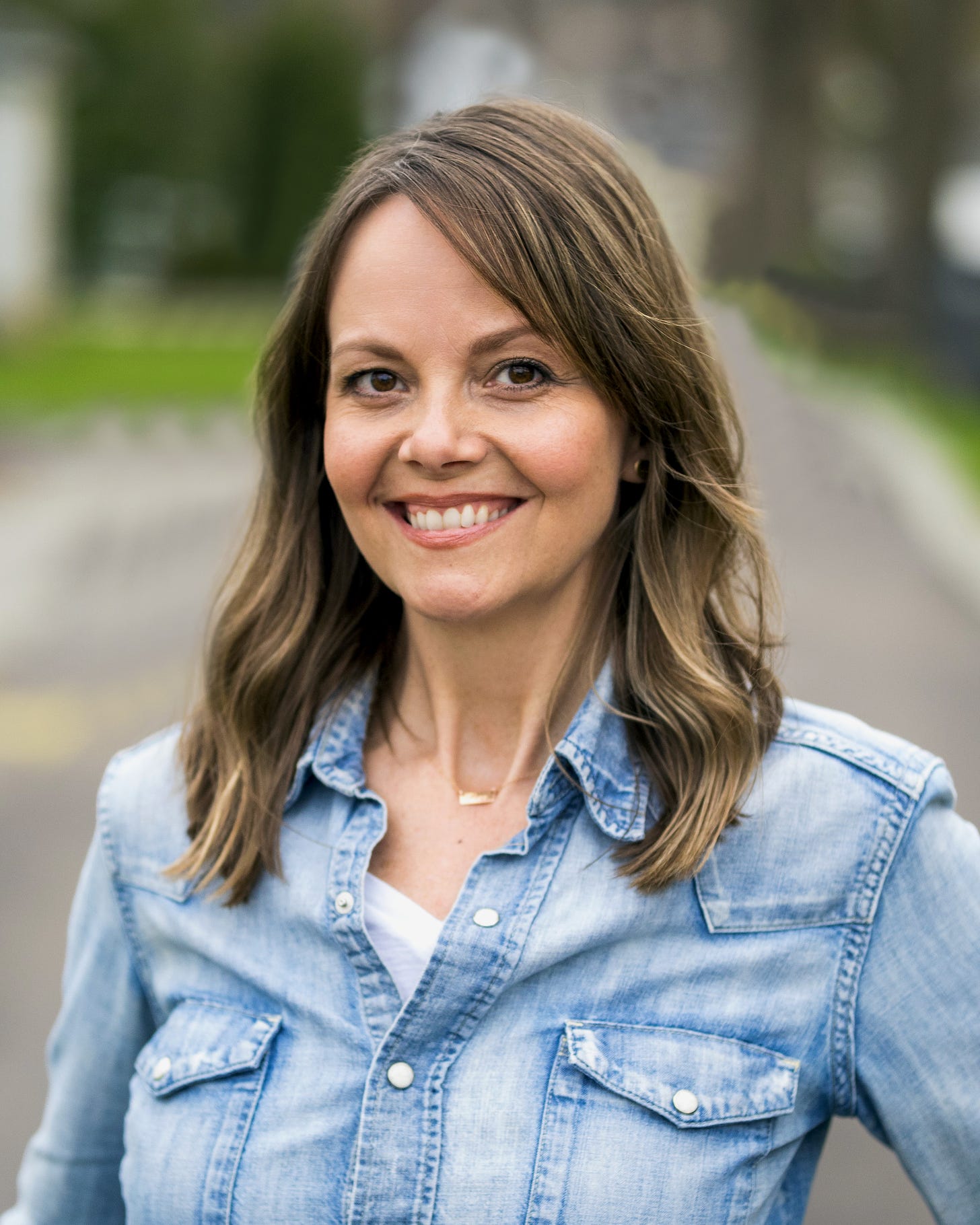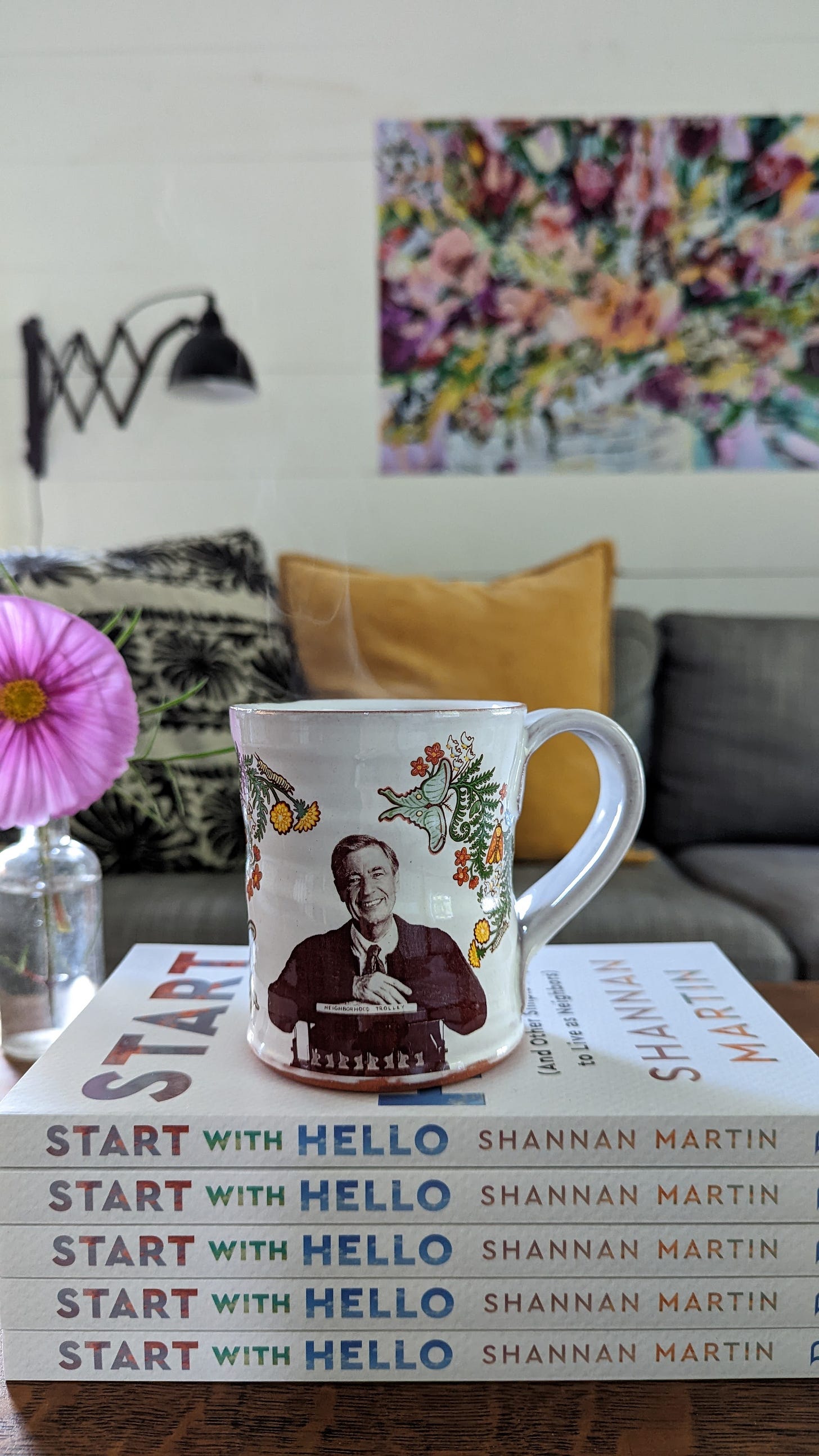'Checking the right boxes with the wrong heart'
5 questions for writer and wisely needy neighbor Shannan Martin
I first read Shannan’s writing when she responded to my call for thoughts on school integration. I was still deluding myself that I could process my questions through a few On Being columns (and here I am a book and many years later…). In any case, she wrote me about the fallout that occurred following breaking from the norm of her peers when she made the choice of where to send her kids to school:
Now, we’re over here, alienated by many of the people who should love us most, because we dared venture into “enemy” territory. We sent our kids to a “failing” elementary school where, they told us, there would be drugs, evolution, gay people, and gangs.
It is the best thing that ever happened to us.
I cringe to know how much a part of the problem I once was. I can only hope I continue to grow in ways that grind my old paradigms into dust.
I could feel how the human being behind these words was alive, awake, and talented to boot. I wanted more. I was in luck! Soon I would learn that she was the Shannan Martin of this compelling Instagram account and this newsletter and the writer of many books, most recently Start with Hello (And Other Simple Ways to Live as Neighbors).
I had to catch up with her to ask her about this new book, which feels like it describes the sort of dynamics which I have often found ineffable. It’s a paradoxical read—somehow both so easy and very challenging, delightful and heartbreaking, light and heavy. I know you’re going to love the way Shannan moves through the world…
Courtney Martin: Why did you write this particular book with this frame and this style right now?
After writing two previous books around the conceptual edges of “neighbors” and “community,” I knew I wanted Start with Hello to answer the question I’m most often asked by others: How do I do it? That’s the question I carried when my family moved to our beloved neighborhood in Goshen, Indiana, eleven years ago. The idea of building relationships slowly, over time, with the people near us can feel daunting. And yet, I’ve learned from my actual neighbors that it’s a reality within reach. We tend to overcomplicate it, or we spiral into anxiety and overwhelm, but it’s much simpler than we’ve been taught.
Start with Hello is a field guide for breaking it all the way down into small steps that can be integrated into our full lives, regardless of who we are or where we live.
To widen the scope a bit, as we creep out of a global pandemic while simultaneously suffering the scrapes of polarization, division, and just plain meanness, the idea of living as neighbors gains urgency.
We have entered a crisis of togetherness.
There’s something to be said for blunt honesty, but can we dare to imagine a better way forward when so many of us (myself included!) advertise our deepest beliefs on our front lawns? How do we navigate this age of competing flags and declining levels of empathy? And because personal beliefs translate into laws and policies that affect us unevenly, how can we get better at supporting each other (and drawing appropriate boundaries) within the fabric of our actual lives? These are some of the questions that frame Start with Hello.
I love this so much: “If I allowed myself to operate from a ‘mine first’ mentality--my family, my home, my preferred social cliques--I would collapse each evening in a heap of fleece and tortilla chip crumbs, certain my time and bandwidth were exhausted by the daily grind, nothing left over to give.” I think this is SO many people’s experience. Is it about having “lower standards” in our private realm so we can have more ambition in the public realm? Or is it about something else?
Life is just so much right now. Everything feels harder and more fraught. Most of us are at peak “max out,” and at least medium-lonely. This tricky combination underscores the need to put some intention behind our desire for basic connections. It’s time to go first. If we wait until we have an abundance of capacity, it will likely never happen. Let’s acknowledge that up-front.
This work of learning to live as neighbors isn’t complicated, but it requires something from us. I don’t think about it in terms of a private vs. public realm. For me, it makes more sense if I integrate the two, and really see my life with my family, behind our front door, as being interwoven with the lives outside that door. We run into trouble when we separate the two. Because you’re right, most of us feel like we don’t have much left to give after we meet the needs inside our own walls. When we make the switch and reorient our identities around community, all of us in this together, we realize there’s enough for everyone. We take turns being a little needy and saving the day.
Speaking personally, my kids have not suffered for this. I want to be clear about that, because it’s a question many of us carry. We’re warned to give the best of ourselves to “our own,” but we have permission to reframe this in acknowledgement that we all belong to each other. It has been to the wild benefit of the Martin kids that they sometimes share me and Cory with others, or share our space and our table with others. We can absolutely meet the needs of our families with other people in the room.
I found your ideas about how to plumb our own motivations and root out saviorism super helpful. How have you become more conscious of that in yourself? You seem like a real helper through and through.
I come from a culture that foists the “helper” identity on women. I was taught this is a very good thing. (And it can be.) But I had to embark on the uncomfortable and even painful work of inspecting my motivations, particularly when we moved into a neighborhood with plenty of visible “need.” I began to be honest about my habit of making assumptions – and judgments - about people experiencing material poverty. I had to overhaul my listening skills.
Mutual “neediness” is a hallmark of connected community.
We were built to know each other and need each other. But I was too quick to ascribe need rather than trusting the people around me to say what they needed. I also had to get over my predisposition to think of “my” way as the “right” way. This one was painful, because it’s rooted in such deep privilege, and even white supremacy.
The most helpful practices for me as I navigate these learning curves are to say less, listen more closely, continue to educate myself on race and power dynamics, and above all, take every opportunity to receive from the people around me. We ask for what we need and we offer what we can. It has to be a two-way street.
I was floored by the phrase “checking the right boxes with the wrong heart.” Can you say more about what that is?
So many of the ways we move through the world can ultimately be performative. The politicized idea of “virtue signaling” irks me, but there’s a kernel of truth there and it happens on both sides of the aisle. We’re smart people who follow the news and want to be on the “right” side of history. But it’s too easy to trade meaningful action (which often feels slow, hidden, and even insignificant) for a social media hot-take. Leading with our hearts is far more taxing than drafting a tweet. Even casting a vote (please vote!) is easier than walking with real people through the low-tides of life.
As we pay closer attention to our communities, we find ourselves caring more deeply. We come to care for each other by name, which can lead to both joy and pain. It can get complicated and messy. But that’s the abundant life we seek. We get to experience all life throws at us, together. That’s the sort of stuff that changes us.
There is a lot of writing about gathering in this book--spontaneous, planned, full of food and humor and humility. Can you please describe your current dream evening with neighbors?
Yes, my parents modeled this really well for me, back in the 80’s. I’ve had to learn my way back to those roots. I packed Start with Hello with simple steps to create a culture of spontaneous gathering. As with most things in the book, much of what I know was learned from my neighbors’ examples. I wrote about the evening our friends stopped by unannounced. We sat around the table chatting for an hour or so. At one point, Jason helped himself to a tangerine from the fruit bowl, then wandered over to the silverware drawer for a fork, which he used to pry open the peel. It sounds so inconsequential! But I think we are craving this sort of easy togetherness on a cellular level. We want those ordinary, but meaningful, connections. We want people to be comfortable in our kitchens, to know which drawer hides the forks, and that they can help themselves.
This is a basic and particular sort of belonging, and it makes life better. Even if the idea makes us nervous at first, we’re intrigued by the thought that we could find our way back to “drop-by” friendship.
To answer your question, my current dream evening with neighbors involves our rusted-out fire pit and a bag of marshmallows. The kids can run around while the adults stay warm by the fire. The leaves are at peak magnificence right now, so the vibes are free of charge. I would invite a couple of my co-workers from the community kitchen, because I know their kids are itching for a bonfire. With any luck, the new neighbors across the street would wander over. At the end of the night, we’d fall asleep with happy hearts and smoky hair. That’s the dream.
So tell me, do you want your neighbors’ to know where the forks are hiding in your house? Ha! But seriously, how does this strike you? Are you craving more interconnections with your neighbors?
Also, we are donating to Elkhart County Clubhouse in Shannan’s hometown in her honor. She explains: “It’s part of the global ‘Clubhouse’ non-profit network, a day house where people with mental illness can gather to work together and build relationships. I know many friends and neighbors who benefit from its services.”






Fantastic affirmation of “Only connect…” I just ordered Start With Hello and donated to Shannon’s Clubhouse. Can’t wait to read her inspirational book! DD
Oh, two of my faves in conversation--how rad. I'm feeling the pull to post-pandemic neighborliness again, even as my introvertism feels WHITE HOT at the moment. Sometimes just leaving my house, looking around, a wordless wave, feels like enough for a day. Love the reminder that love is in the micro-moves.